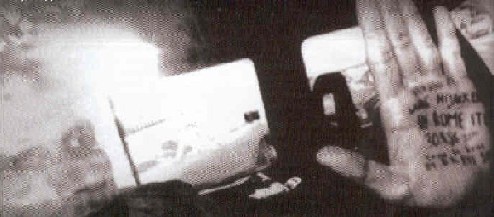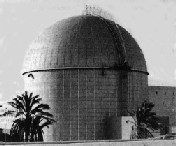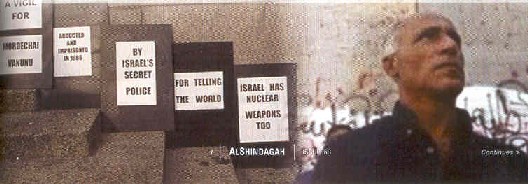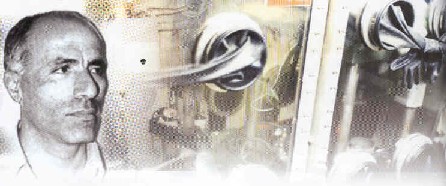|
|
 |
|
Mordechai Vanunu:
Still a thorn in Israel's Side |
By Linda S Heard
Israel’s
nuclear whistleblower Mordechai Vanunu was last April released
from an 18-year incarceration in an Israeli prison, much of it
in solitary confinement. His ‘crime’ was treason after telling
the world about Israel’s secret nuclear programme underway at
the country’s Dimona reactor, tucked deep in the Negev desert
away from prying international eyes. If Vanunu’s detractors
expected to see a silenced and broken man emerge from behind
bars, they were sorely disappointed.
For some, Vanunu, a nuclear technician, who worked at the
Dimona facility, is a traitor, who deserves the death penalty.
Others view him as a hero, who put the well being of the
planet and all of humanity, before narrow nationalistic
concerns. During his imprisonment he became an icon to the
international peace movement and was a Nobel Peace Prize
nominee.
Vanunu may have served his sentence and is now physically out
of gaol, yet he remains in a virtual open prison. The Israeli
government claims he still has secrets to reveal and refuses
to allow him to re-start his life in another country – his
long cherished dream.
He is forbidden from travelling; moving to another city;
sleeping outside his registered East Jerusalem home – shared
with Palestinian friends - without prior permission; going
anywhere near a foreign embassy or consulate; giving press
conferences and talking to non-Israelis.
Shunned by his religious Moroccan Jewish parents for
converting to Christianity and betraying the Jewish state,
Vanunu was adopted by Nick and Mary Eoloff a sympathetic
American couple, who hoped he would be eligible for an
American passport.
Said Sabby Sagall, a member of the former ‘Campaign to Free
Vanunu and for a Nuclear Free Middle East’ described him as
“one of the bravest and most inspirational people of our time.
If Bush and Blair want to find weapons of mass destruction in
the Middle East, Vanunu has told them where to go.”
 Campaign secretary Ernest Rodker said: “He is in some physical
danger if he remains in Israel. A talk show host called for
him to be wiped out recently.” Campaign secretary Ernest Rodker said: “He is in some physical
danger if he remains in Israel. A talk show host called for
him to be wiped out recently.”
The investigative journalist who initially exposed the
whistleblower’s revelations Peter Hounam said on Vanunu’s
long-awaited release: “It’s a terrible tragedy. I’ve been
waiting since 1986 for this moment. I want him to be able to
resume his life, maybe get married and have kids”. Vanunu
himself would like nothing more as long as his new life is far
from Israel.
Says Vanunu, who is in serious danger of being assassinated by
Jewish extremists: “I can enjoy my freedom but I am not
totally free to have the freedoms every other human being has,
to walk in the streets meeting and talking to anyone.”
He maintains he spilled the beans on everything he knew during
the 1986 interview with Britain’s Sunday Times and has
nothing left to reveal. Many experts accept this statement as
true, based on so many technological advances in the nuclear
field over the past 18 years of which Vanunu could have little
knowledge. If Vanunu has no more secrets to impart why won’t
the Israeli government let him go?
There are those who believe the Israeli government is simply
out for revenge, while others view Vanunu as a walking
anti-Israel propaganda weapon.
Whatever the truth of the matter, Vanunu refuses to take the
government’s restrictions lying down. On the day of his
release he defiantly gave a mini press conference to the
waiting crowds while still in the prison grounds as the
annoyed guards helplessly looked on, describing his
incarceration as “cruel and barbaric”.
It wasn’t long after that he gave an interview conducted by
Israeli broadcasters, which aired on the BBC. Peter Hounam
apparently acted as an intermediary to arrange the interview
on the British broadcaster’s behalf and was subsequently
arrested and deported. As a result, the Israeli authorities
are investigating whether Vanunu has broken its injunction not
to give interviews to the foreign press, when, if found
guilty, he could find himself back in his cell.
Some 130 British Members of Parliament are outraged at
Vanunu’s having to exist in limbo land after paying his legal
dues to the State of Israel and have signed a motion calling
for him to be allowed to leave the country. Britain’s Foreign
Secretary Jack Straw has been asked to intervene.
Frustrated at his unconstitutional virtual imprisonment,
Vanunu petitioned Israel’s Supreme Court to no avail. Instead,
three senior judges upheld all the government’s restrictions
arguing that he was still a security risk.
“We always say Israel is not a real democracy and today we are
seeing it inside the Supreme Court,” Vanunu told reporters
following the decision. “My country is not Israel,” he said.
“For 18 years, Israel condemned me as a traitor and a spy”.
Vanunu remains scathing about Israel’s nuclear ambitions and
has no hesitation about denouncing Dimona as a Chernobyl
waiting to happen warning that millions of people in
neighbouring countries could be threatened following a
possible accident. He went as far as advising Jordan to test
residents around its border with Israel to ensure they haven’t
already been exposed to nuclear radiation.
Perhaps cognisant of the warnings of Vanunu and others, Israel
last month declared its intention to distribute anti-radiation
pills to those people living within a 30 km radius of its
reactors, upsetting many residents who had previously been
constantly assured they were in no danger.
Vanunu further controversially announced: “according to
near-certain indications” the late U.S. President John Kennedy
was assassinated because of “pressure he exerted on Israel’s
then head of government David Ben-Gurion to shed light on
Dimona’s nuclear reactor”.
Vanunu
Story

Born
in Marrakesh, the 49-year-old immigrated to Israel along with
his parents and 11 siblings in 1963. After serving a mandatory
three years with the Israeli Defence Forces, he worked as a
technician at Dimona from 1976 until 1985 while simultaneously
taking a university course in philosophy. It was during this
period that he began to feel unhappy about various policies of
the Israeli government, especially its treatment of
Palestinians. It wasn’t long before he attracted unwelcome
government attention because of his views as well as his
membership of a radical group called Campus, made up of both
Jews and Arabs.
By the time he was made redundant in 1985 Vanunu had already
experienced a “crisis of conscience” over Israel’s clandestine
nuclear programme and had begun covertly photographing the
Dimona facility without, at that time, having a clear picture
of what he would do with the pictorial evidence.
After a spell travelling around the world financed by his
redundancy payment and supplemented with odd jobs doing dishes
and chauffeuring taxis, he flew to Australia. It was there he
was baptised into the Anglican Church and decided to share
Israel’s nuclear secrets with the rest of the world.
A Columbian journalist friend alerted the Sunday Times to the
potential story and the paper sent Peter Hounam to Australia
to check-out Vanunu’s credibility. Hounam liked him right away
and flew him to England.
Even before the story hit the British newsstands, Vananu had
disappeared. Feeling vulnerable and lonely he was taken in by
an “American tourist” called Cindy, who voiced her criticism
of the Israeli government. Pretending to be attracted to
Vanunu, she suggested they go on vacation together to Italy
where she said her sister lived. As soon as the couple opened
the door to the Rome apartment, Vanunu came face to face with
Mossad agents who injected him with drugs before shipping him
back to Israel where a trial was held behind closed doors.
Policy of ‘Nuclear Ambiguity’
Israel’s
nuclear road began with a lie in which France was heavily
implicated. Indeed, French engineers constructed the Dimona
reactor and plutonium-separation plants in the 1950s. Later
on, France supplied Israel with uranium from its then African
colonies. In official Israeli parlance the complex was “a
manganese plant”.
When aerial photos showed otherwise the then Israeli Prime
Minister announced in December 1960 that a 24-megawatt reactor
had been built for peaceful purposes. The U.S accepted this
statement at face value and persuaded Israel to agree to
inspections, which took place at various intervals until 1969.
Inspectors only got to see the upper floors as lifts going
down to the hidden underground plutonium plant were sealed and
camouflaged.
When France was no longer able or willing to supply Israel
with uranium yellowcake subsequent to 1967, South Africa
stepped into the breach. A Centre for Non-Proliferation
Studies’ report sets out four “clandestine nuclear deals”
between Israel and South Africa related to yellow-cake and
tritium.

At some point the Americans chose to turn a blind eye to
Israeli WMD, even though it received a wealth of information
that Israel and South Africa were jointly carrying out nuclear
tests in the ocean.
To this day Israel has not admitted having a nuclear weapons
programme and has never signed up to the Non-proliferation
Treaty. Its refusal to do so has prompted 13 votes in the UN
General Assembly since 1987 demanding its compliance. The U.S.
has consistently blocked any attempts to put the issue before
the UN Security Council.
Vanunu recently criticised an official visit to Israel by
Mohammed ElBaradei Head of the UN nuclear watchdog the IAEA.
“I am very disappointed in Mr. ElBaradei,” he said, “because I
expected him to go and inspect the Dimona reactor…the job of
Mr. ElBaradei is to go and see if what I said…if it’s true”.
Few experts have ever disbelieved Vanunu’s revelations, backed
up with photographs, and yet Israel has never admitted that it
has a nuclear weapons programme, let alone a stockpile of up
to 200 nuclear warheads – the world’s fifth largest cache.
A 1997 Jane’s
Intelligence Review report suggests Israel has over 400
thermonuclear and nuclear weapons. As for delivery systems,
Israel is said to have Jericho missiles with ranges up to
1,500 km, while the Shavit satellite launch vehicle is capable
of conversion into an intercontinental ballistic missile with
a 7,800 km range.
Thanks to people of conscience like Mordechai Vanunu and
following the spotlight on Iraq’s non-existent nuclear
weapons, the world’s WMD focus is fixed firmly on Israel for
the first time. This international scrutiny has prompted
Israel’s Atomic Energy Commission to publish photographs of
the country’s Dimona and Nahal Sorek reactors for the first
time.
U.S. Turns A Blind Eye
So
why have a succession of American governments been seemingly
unconcerned about Israeli nukes? Israel is the only democracy
in the Middle East and shares our values, say a chorus of U.S.
leaders, who believe Israel can be trusted not to use them.
But can it?

According to numerous reports Israel came close to unleashing
nuclear weapons during the 1973 war. Time magazine
reported the then Israeli Defence Minister Moshe Dayan as
saying: “This is the end of the “third temple” with “temple”
being the code word for nuclear weapons. A story put out by
the Israelis – no doubt as a deterrent – describes nuclear
missiles having been pointed at Damascus and Cairo at the
time. We should also recall that Israel remained on nuclear
alert during the 1991 Gulf War.
One thing is for sure. The more the U.S. and its allies sabre
rattle about Iranian and North Korean nuclear programs the
more Israel will squirm.
Israel is the regional threat and as long as it remains so,
other nations will seek a nuclear parity with the full moral
right to do so, when the world will become an even more
dangerous place.
Vanunu has lost 18 prime years of his life but there is no
doubt that if he had the chance he would do it all over again.
“There is no regret,” he said, “only satisfaction that I
succeeded in doing it. From the beginning it was clear for me
that I did the right thing, that I followed my conscience. I
did it for peace. I have the full right to inform the world
that the Israeli government was cheating and lying [concerning
the existence of its nuclear weapons program].”
Did Mordechai Vanunu do the right thing? Is he a hero or is he
a traitor to his country? It’s your call.
| 